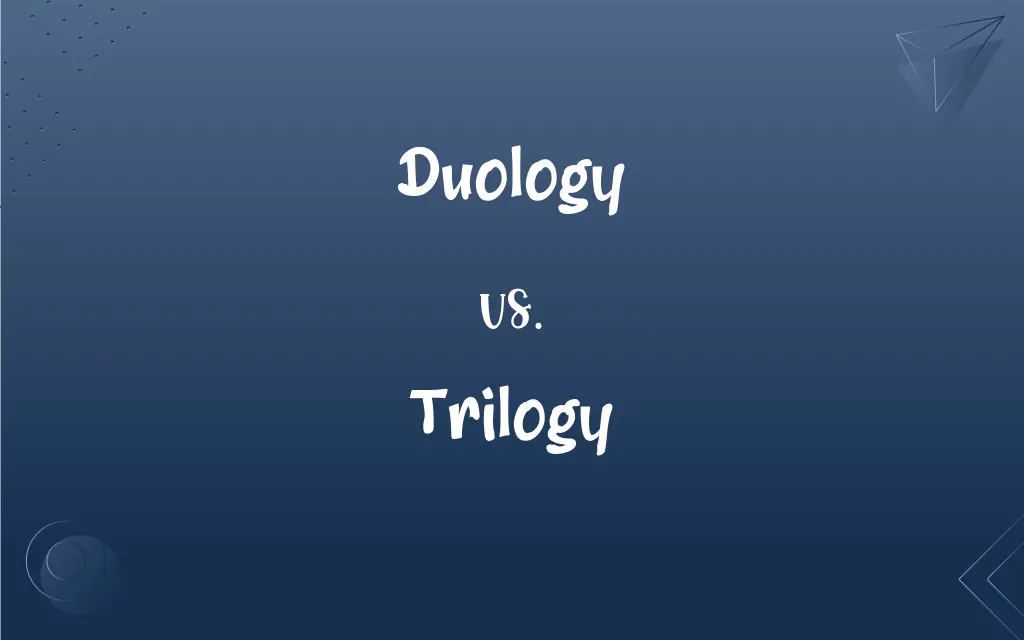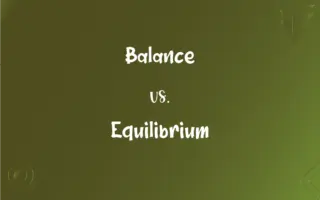Duology vs. Trilogy: What's the Difference?
Edited by Harlon Moss || By Janet White || Updated on November 30, 2023
A duology is a series of two related works, typically books or films, while a trilogy is a series of three related works.

Key Differences
A duology consists of two works that are connected in theme, characters, or narrative, forming a complete story across two parts. On the other hand, a trilogy extends this concept, weaving its story or themes across three distinct but interconnected parts.
Duologies allow for a story to be expanded in greater depth than a single work, offering a more detailed exploration. Trilogies provide even more space for character development and complex plotlines, building across three separate works.
In a duology, the narrative is typically split into two significant segments, allowing for a beginning, development, and conclusion over two parts. While, in a trilogy, the structure often follows a beginning, middle, and end format, each part contributing to the overall arc.
The use of a duology is less common than a trilogy in literature and film, as the latter has a more traditional and widely accepted structure in storytelling. Trilogies are particularly popular in epic narratives, where the story benefits from an extended unfolding.
Both duologies and trilogies can be seen in various genres, but the way they are used to tell a story differs due to the number of parts involved, impacting the pacing and depth of the narrative.
ADVERTISEMENT
Comparison Chart
Number of Parts
Two related works
Three related works
Narrative Structure
Beginning and conclusion over two parts
Beginning, middle, and end across three parts
Commonness
Less common than trilogies
Widely used, especially in epic narratives
Depth of Exploration
Detailed exploration in two segments
More space for character and plot development
Genres
Used in various genres
Popular in epic and complex narratives
ADVERTISEMENT
Duology and Trilogy Definitions
Duology
Two works connected by theme, characters, or narrative.
The duology’s first book sets up an intriguing mystery.
Trilogy
A set of three literary or cinematic works that are connected.
The trilogy spans three generations of the family.
Duology
A series of two related literary or cinematic works.
The author's latest duology explores historical themes.
Trilogy
A series of three works that form a complex story.
The final installment of the trilogy resolves all conflicts.
Duology
A pair of works that together complete a story.
The duology concludes with a satisfying resolution.
Trilogy
Three interconnected works in a series.
Each book in the trilogy explores different themes.
Duology
A set of two connected creative works.
The duology's second part reveals the plot's twists.
Trilogy
A group of three related movies or books.
The trilogy's epic scale has captivated audiences worldwide.
Duology
A two-part series in literature or film.
This duology has become popular among young adults.
Trilogy
Three related works, often following a continuous narrative.
The second book in the trilogy is the most suspenseful.
Duology
(nonstandard) A series comprising two parts, particularly in genre fiction.
Trilogy
A group of three dramatic, literary, or other creative works related in subject or theme.
Trilogy
A set of three works of art that are connected, and that can be seen either as a single work or as three individual works. They are commonly found in literature, film, or video games.
Trilogy
A series of three dramas which, although each of them is in one sense complete, have a close mutual relation, and form one historical and poetical picture. Shakespeare's " Henry VI." is an example.
On the Greek stage, a drama, or acted story, consisted in reality of three dramas, called together a trilogy, and performed consecutively in the course of one day.
Trilogy
A set of three literary or dramatic works related in subject or theme
FAQs
What is a duology?
A set of two related books or films that form a complete story.
What is a trilogy?
A trilogy is a series of three interconnected works, often following a continuous narrative.
Can a duology have different genres?
Yes, duologies exist in various genres, including fantasy, drama, and sci-fi.
Can a trilogy be written by different authors?
Typically, a trilogy is written by the same author, but collaborative trilogies exist.
How does a trilogy differ from a duology?
A trilogy has three parts, allowing for a more complex story than the two-part structure of a duology.
How is character development handled in trilogies?
Trilogies allow for in-depth character development over three distinct segments.
Are both parts of a duology equally important?
Yes, each part contributes significantly to the overall story.
Are trilogies limited to a specific genre?
No, they span various genres, including mystery, fantasy, historical fiction, and more.
How do readers perceive duologies?
Duologies are often appreciated for their concise storytelling.
Do trilogies always have a conclusive ending?
Typically, yes, the third part of a trilogy brings closure to the story.
How is a duology structured?
It typically has a beginning and conclusion spread across two parts.
Is a trilogy more common than a duology?
Yes, trilogies are more traditional and widely used in storytelling.
Can duologies become trilogies?
Yes, if a third connected work is added, a duology can evolve into a trilogy.
Can a duology have a cliffhanger ending?
Yes, the first part may end on a cliffhanger, resolved in the second part.
Are trilogies planned from the start?
Often, but some evolve from standalone works or duologies.
Are film adaptations of duologies common?
They are less common than trilogies but do exist.
Do duologies require reading in order?
Yes, to understand the complete story, it's best to read them in sequence.
Do trilogies have recurring themes?
Yes, themes often develop and recur throughout a trilogy.
Is it challenging to write a trilogy?
Writing a trilogy can be challenging due to the need for consistency and development over three parts.
Are duologies and trilogies part of series?
Yes, they are considered series, with a duology being a two-part series and a trilogy a three-part series.
About Author
Written by
Janet WhiteJanet White has been an esteemed writer and blogger for Difference Wiki. Holding a Master's degree in Science and Medical Journalism from the prestigious Boston University, she has consistently demonstrated her expertise and passion for her field. When she's not immersed in her work, Janet relishes her time exercising, delving into a good book, and cherishing moments with friends and family.
Edited by
Harlon MossHarlon is a seasoned quality moderator and accomplished content writer for Difference Wiki. An alumnus of the prestigious University of California, he earned his degree in Computer Science. Leveraging his academic background, Harlon brings a meticulous and informed perspective to his work, ensuring content accuracy and excellence.
































































